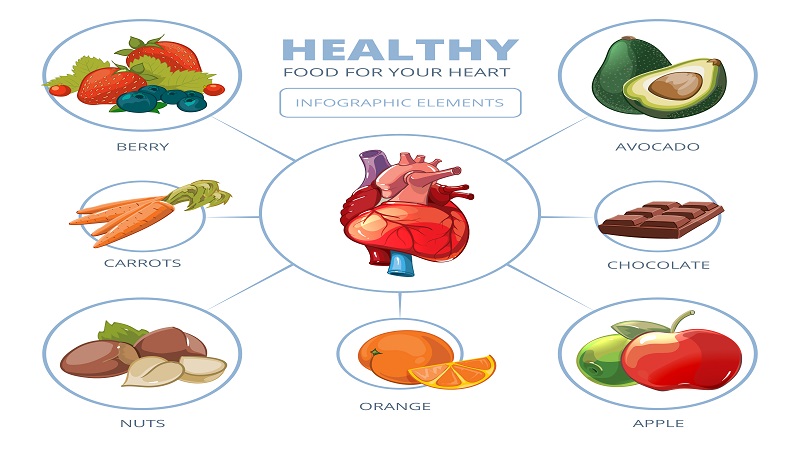It’s time of that year again – to make new resolutions and newer health commitments to yourself. But as we step into the new year, let’s not just focus on fitting into smaller pairs of jeans but also on nurturing and protecting our hearts. After all, health is not just about looking good; it’s about feeling good inside out.
So, whatever your weight loss resolution this year, make sure to prioritize the well-being of your heart along the way. In this blog, we’ll guide you through seven heart-healthy diets to consider in the new year. However, before embarking on any diet, it’s important to consult a board-certified physician, like Dr. Lala, before starting a new diet plan.
Best Diets for Heart Health in 2024
1. DASH Diet
Low in salt and added sugars, the DASH diet – which stands for Dietary Approaches to Stop Hypertension – is designed to prevent and manage high blood pressure. The diet also limits the intake of tropical oils (rich in saturated fat) and red meat, while encouraging the consumption of nutrient-rich foods, including fruits, vegetables, lean proteins, and whole grains. By minimizing sodium intake and promoting potassium-rich foods, this diet not only helps control blood pressure but also supports overall heart health. It’s not just a diet; it’s a lifestyle choice that nourishes your heart for a healthier and happier you.
2. Mediterranean Diet
The Mediterranean diet has long been celebrated for its heart-protective benefits. Rich in fruits, vegetables, whole grains, and healthy fats like olive oil, this diet emphasizes lean proteins, such as fish and poultry. With its focus on plant-based foods and omega-3 fatty acids, the Mediterranean diet can help lower cholesterol levels and reduce the risk of heart disease.
The diet however allows a moderate amount of red wine. This has sparked some controversy regarding the benefits and potential risks of this diet. But some research suggests that when consumed in moderation, wine can help protect your heart.
3. TLC Diet
The TLC (Therapeutic Lifestyle Changes) diet has been created by the National Institute of Health’s National Cholesterol Education Program to help people lower their unhealthy cholesterol levels, which are directly linked to increased risk of heart disease.
TLC diet is predominantly a plant-based diet that urges people to limit the consumption of foods products that are high in cholesterol and saturated fats, including red meat, butter, and full-fat dairy products. Instead, it encourages people to eat plant-derived foods such as fruits, vegetables, legumes, and whole grains. This diet is rich in fiber, antioxidants, and essential nutrients and helps in lowering cholesterol, blood pressure, and heart disease.
4. The Flexitarian Diet
The flexitarian diet combines the best of both worlds – the flexibility of a predominantly plant-based diet with occasional inclusion of lean meats. By focusing on plant-based foods while allowing room for occasional meat consumption, the flexitarian approach provides a balanced and sustainable way to support heart health. A flexitarian meal consists of whole grains, fresh produce, and proteins, like beans, lentils eggs, legumes, nuts, and nut butter.
5. Low-Sodium Diet
Though sodium is an essential mineral that is involved in many important bodily functions, excessive sodium intake may lead to hypertension and an increased risk of heart disease. A low-sodium diet is designed to reduce the intake of salt, a primary source of sodium. Reducing sodium intake helps in maintaining healthy blood pressure levels and decreases the strain on the heart. This type of diet is often recommended in hospital settings where the aim is to control or improve certain medical conditions.
A low-sodium diet involves minimizing the consumption of processed, packaged, and preserved foods like chips, fast foods, and frozen dinners while opting for fresh, whole foods. Instead of adding excessive salt to the food, the diet encourages people to flavor their food using herbs and spices.
6. Anti-Inflammatory Diet
Chronic inflammation is linked to various health issues, including heart disease. An anti-inflammatory diet involves consuming foods that help combat inflammation, such as fatty fish, berries, leafy greens, and nuts. By avoiding processed foods and excessive sugar, this diet supports heart health and overall well-being.
7. Gluten-Free Diet
A gluten-free diet was initially developed for individuals suffering from celiac disease or gluten sensitivity. However, over the years, it has gained popularity beyond its original scope. While gluten is not inherently harmful to those without gluten-related disorders, a gluten-free lifestyle provides several health benefits.
This diet excludes foods containing wheat, barley, rye, and their derivatives. While not directly linked to heart health, a gluten-free diet may indirectly support cardiovascular wellness by promoting the consumption of naturally gluten-free, nutrient-rich foods. It’s essential for those considering a gluten-free diet to ensure they maintain a balanced and heart-healthy nutritional profile.
The Bottom Line
Embarking on a heart-healthy diet journey is a commendable resolution for the new year. Whether you’re exploring the Mediterranean, DASH, or any other diet, the key is to prioritize balance, eat a variety of foods, and make wholesome choices. It’s not just about losing weight or fitting into those jeans; it’s about nourishing your heart for a healthier, happier you.
Consult a certified physician like Dr. Lala for personalized guidance on the most suitable dietary approach for your individual needs and goals. Make healthy food choices and stay cheers to a heart-smart 2024!




